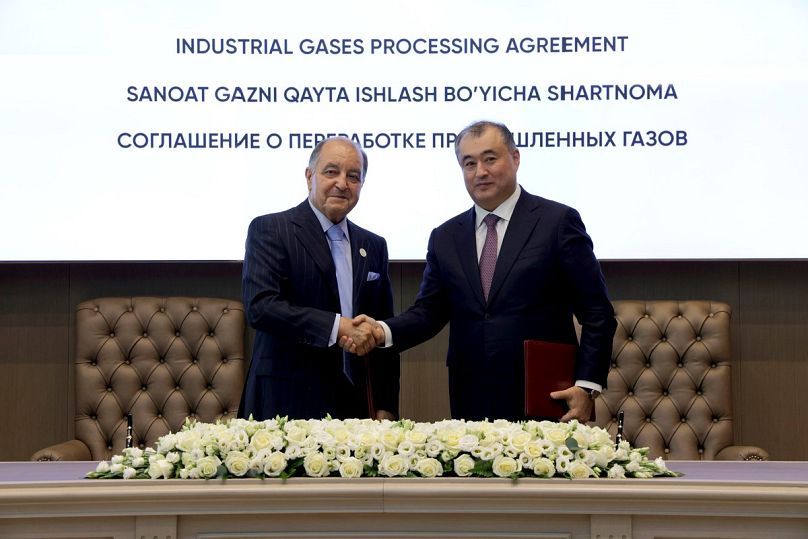As Uzbekistan’s growth and development continue to accelerate away from solely relying on material extraction, the country is utilising a new resource for growth: free economic zones.
 ADVERTISEMENT
ADVERTISEMENT
 ADVERTISEMENT
ADVERTISEMENT
Five years ago, the Central Asian nation only had five such zones, commonly known as FEZ.
Now, there are 24 fully operating or on the way as the country looks to shift its economy from agriculture and raw materials extraction to industrialisation, in line with a goal set by the President to accelerate this transformation and make innovation a key contributor to development.
One of the fastest-growing is the Karakul FEZ in the Bukhara Region, about 600km south-west of the capital Tashkent and close to neighbouring Turkmenistan.
Here, a $6.3 billion (€5.7 billion) megaproject is taking shape. It was launched in July last year and has already filled 80 per cent of the space at the 556-hectare site. Due to its success, the free zone is expected to expand in the future.
Spearheading one of the country’s biggest developments is the huge rise of demand for raw materials - such as the substantial oil, gas and coal reserves it sits on as well as an abundance of base metals - both domestically and internationally.
There is also growing demand to efficiently process its wealth of natural resources within its own borders, rather than them being destined for export to be processed elsewhere.
One of the projects leading the way in Karakul FEZ is the colossal Gas Chemical Complex MTO.
As the Ministry of Energy sets its sights on diversifying the nation’s economy and moving away from being a net importer of products such as polymer products, the $3.1 billion (€2.85 billion) complex that spans 15 hectares, will produce 1.1 million tonnes of polymer materials when it opens in 2025.
“This is an important step in the development of the energy industry of our country, contributing to the creation of the first industry platform in the Republic of Uzbekistan and Central Asia for the implementation of large gas chemical projects,” Masrur Shakirov, general director of the project, previously said.
He added how it will contribute to the development of the region and the creation of more than 2,300 new jobs.
Karakul FEZ forms part of a “cluster”, a zone dedicated to the polymer industry. All of its assets will focus on polymers in order to increase competitiveness, reduce costs and ensure sustainable sales, benefitting from the presence of polymer producers and end users in the same territory. The complex will manufacture polypropylene, low-density polyethylene, ethylene vinyl acetate and polyethylene terephthalate – it will be the first time the nation has produced the last three.
It will do so by using low-content natural gas from the nearby Mubarek fields that will be fed through cutting-edge processing plants before being turned into high-value polymers.
Footwear, sports equipment, pipes, fittings, furniture, helmets, food packaging, flooring, solar panels and freezer containers are just some of the everyday products created using them. Not surprisingly, the polymer industry is one of the fastest growing segments of the world economy. Global demand for polymers is growing at an accelerated pace, and Uzbekistan is no exception. The current average consumption of polypropylene in Uzbekistan is 5.3 kg per capita (when, for example, in Turkey this figure is 23 kg), which shows enormous room for growth.
In addition to the gas chemical complex, which became the free zone’s first resident when it moved in in December last year, the area will house SAG and UrGaz, the largest manufacturers of carpets; pipe manufacturer Vero Group; textiles producer Mergantex; Karakulkimyo, a fertiliser production company; Arkchemical, a manufacturer of polymer raw materials; and Enter Steel, a manufacturer of metal structures. The leading international company Air Products has also taken a stake in the project. In 2023, a ceremony was held to sign an agreement on the implementation of the project for the construction of "Methanol Island" - a methanol production plant with a capacity of 1.34 million tons per year,
The area is expected to generate $11 billion in net income from these industrial activities for the next 25 years.
Around 5,000 jobs are expected to be created at the FEZ, which will lead to the creation of a further 10,000 across the country.
One of the key reasons why global nations - from the UAE to the UK - are increasingly turning to adopting free economic zones is to stimulate business growth and development in areas that operate under special laws.
These include customs and tax benefits, simplified permits across finance, credit and legal activities and the removal of red tape to help speed up the development stages from conception to execution.
The special legal regimes at free economic zones are aimed at catering to social interests while creating an additional incentive for business development.
Companies that set up in the Karakul FEZ will have improved access to benefits - as well as the raw materials and products they create. They will be able to take advantage of the enhanced infrastructure provided by the zone, namely: advanced storage and logistics resources, access to water and electricity, including a 500 MW solar power plant, which will be built in the immediate vicinity of the FEZ.
It’s under these takings that Karakul FEZ’s main investor, the businessman and philanthropist Bakhtiyor Fazilov aims to provide a powerful socio-economic impetus for the development not only of the Bukhara Region, but also of the whole of Uzbekistan.

